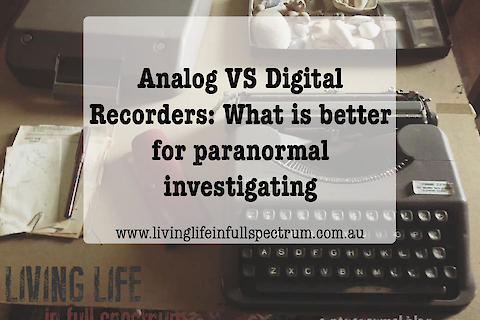

It is pretty easy these days to conduct an EVP session. All you need is your mobile phone and hit the record button and you are good to go. Digital recorders themselves are quite cheap. You can buy versions on EBay as little as around $10. For the more serious investigator or those that use the recorder to record sound for podcasts or filming, the really good digital recorders can set you back a few hundred dollars. There is something for everyone. Some you need to charge, others you just pop in batteries so convenience is a massive benefit. It wasn’t always so easy though. Digital recording technology wasn’t always around in the form it is now and wasn’t as affordable either. So what did investigators do 30 years ago? The used tape recorders. In fact most old school investigators will tell you that tape recorders are better when it comes to paranormal investigating. So what should you use?
(To learn about EVP and what it is all about, visit my article EVP: What does it mean and how do I capture one)
Digital Recorders – Pro
- They are easily accessible and your mobile phone can be a make shift recorder. You can get cheap models off eBay, and most department stores sell them.
- The affordability means that you can have several recorders which you can leave in different places of a location while you are investigating so that you have multiple areas covered.
- It captures a large range well and truly outside the number of Hz the human ear can hear. Most EVPs are recorded under 300Hz and some recorders can hear as little as 7hz.
- You can hook it up to your computer and download the file easily for review and enhancement. (I am not huge on enhancing EVPS but you have the option)
- Models today allow for hundreds of hours of recordings before you run out of space
- A lot of models are powered by batteries meaning if your recorder goes flat, you can simply change the batteries over and keep going
- Some models allow you to adjust the sensitivity of the microphone meaning you can adjust the levels to suit the conditions you are recording in.
- A lot of models allow you to plug headphones direct to the recorder where you can ‘live listen’ meaning you can hear exactly what the recorder is recording. If it was to capture an EVP, you would hear it in real time.
- A lot of models allow live play back meaning you can do EVP burst sessions and instantly review your recording.
- Once you have transferred your files to the computer, you can simply delete them from your recorder and start again. There is no need to buy new tapes.
- They are small and portable. Some devices sit like a watch on your wrist or can clip onto your shirt meaning you can record your every move
- You can plug in an external microphone to enhance the range of the sound you are recording
- It is a nice clean and clear sound making it easy to pick up abnormalities
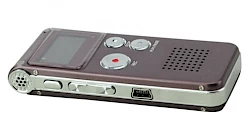
Analog Recorders – Pro
- Magnetic tape (such as a cassette tape) is said in theory by many investigators to be better for recording EVPS because it is easier for an EVP to be imprinted onto the magnetic tape.
- The recording is stored on a tape meaning you have a physical hard copy and it can’t be accidently deleted like a recording on a digital recorder.
- Most tape recorders that investigators use are powered by batteries meaning all you have to do is change the batteries over.
- If you run out of space, you simply change the tape over, whereas on a digital recorder, once you run out of space, you have to either transfer or delete your files.
- The inbuilt microphones are designed to pick up close range sounds meaning that you won’t catch a mouse sneezing which can be the case of a digital recorder. You can easily hook up an external microphone if you wish to increase the range.
- With stop, rewind, play and fast forward buttons, it is easy to play back your recordings on the spot
- You can usually plug in headphones to do live listening so you can hear what the recorder is recording.
- Analog recorders do not compress the data to fit onto a disk meaning the overall quality and it retains the full spectrum of audio that it has recorded.
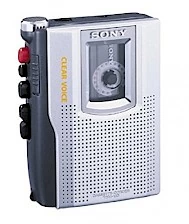
Digital Recorders Cons
- In order to fit all the hours of data onto the memory of the recorder, the audio file is heavily compressed. To make the size of the file smaller, the recorder chops off the frequency range beyond what the human ear can hear. This means you are not getting the full audio spectrum that was recorded and you could potentially be missing an EVP. This is a big con considering the theory is that an EVP is picking up sounds the human ear cannot hear.
- A lot of models don’t take batteries and need to be charged with a charger, usually on a computer. If the recorder goes flat, you cannot use it.
- Digital formats are prone to errors like anything with a computer. It is quite common to find that your file is corrupt when trying to transfer It to a computer.
- The microphones are often too sensitive and the cheaper models do not allow you to adjust the sensitivity meaning you can hear a person breathing in another room. It can make reviewing the EVP difficult.
- When you are reviewing your recording live, you often have to listen to whole file. Cheaper models do not allow you to rewind and only review a portion of your recording, you have to listen to the whole thing. This can be especially frustrating if it is a big file and there is a 2 second block you need to keep reviewing. You often have to wait until you can transfer it onto a computer so you can chop out the portion you need.
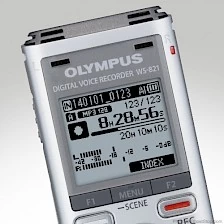
Analog Recorders Cons
- Because it is a mechanical device, some models have what is a static dragging sound. There is also a notorious hiss in the background which you will remember from your 'walkman' days.
- You need to use cassettes and you should not record on the same cassette twice as it is possible to hear fragments of the old recording underneath the new one. While cassette tapes are cheap enough, it becomes a costly exercise in the end. You also end up with quite the collection of tapes.
- A tape may only record 1 - 2 hours of audio meaning you have to keep changing tapes over if you are doing an all night investigation.
- Cassette tapes can easily become damaged and the tape itself can become tangled within the recorder which can ruin your recording.
- Some models are not as small as digital recorders and don’t fit easily into a pocket meaning they have to be set down during an investigation.
- The range it records is usually small meaning they are not the best tools to leave unattended in a large room and you need to attach an external microphone.
- While you can transfer the recording onto a computer, you often need a special piece of equipment to attach to your computer and recording device or in a lot of cases you have to record your recording with a microphone onto your computer making it a lengthy exercise.
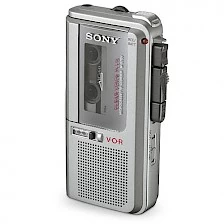
So which is better for paranormal investigating?
A lot of this will come down to how long you have been investigating and what you are used to. Old school investigators swear by analogue, mainly because they claim to have better results which is most likely due to the fact that the audio is not compressed like it is on a digital recorder. It may also be a love for the nostalgia of that time. A lot of new school investigators have probably never even used a tape recorder on an investigation before. With the affordability and convenience of a digital recorder (or even a mobile phone) digital recorders are the more common choice in modern day investigating. The best thing to do? Use both. Then you cover all basis. It can be costly and not as easy to use an analogue tape recorder but it is certainly something every investigator must at least try. Compare your results. Learn how each device records and how it stores it’s audio. Things like the sampling rate and data compression make a huge difference to the end recording. Depending on the device you choose, you could be limiting your chances of getting a great EVP due to how it records and stores it's data. Just because there are cheap digital recorders out there, doesn’t mean they are the best option in the same way the most expensive recorder may not be the best. Work out what works best for you in the way that you investigate. Do you interview people? Do you do EVP bursts or do you just leave a recorder running in the room? Do you need to live listen or attach a microphone? Your style of investigating needs to work well with the type of model you choose. The only way to work this out is trial and error. Isn’t that a big part of what investigating is about anyway?
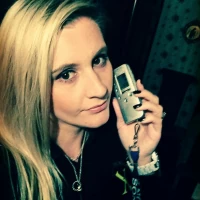
Which do you prefer Analog or Digital? What do you like or dislike about using them? Tell me in the comments below
Don't forget to LIKE the Facebook page for updates on new content www.facebook.com/livinglifeinfullspectrum
If you enjoy LLIFS, consider buying me a book (otherwise known as buy me a coffee but I don't drink coffee and I LOVE books). Your donation helps to fund the LLIFS website so everyone can continue to access great paranormal content and resources for FREE!
 Follow LLIFS on Facebook
Follow LLIFS on Facebook
Don't forget to follow the Facebook page for regular updates
Join the mailing list to receive weekly updates of NEW articles. Never miss an article again!
Buy the latest and past issues Haunted Magazine
Check out the books written by LLIFS